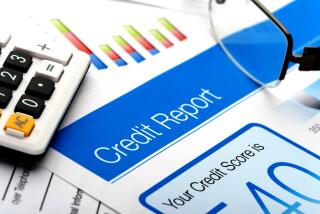‘Credit Scoring’ May Determine If You Get Loan
- Share via
WASHINGTON — How you fare with your next home mortgage application could hinge on your performance on a complex mathematical test you’ve never heard of, never taken and probably will never see on paper.
It’s called “credit scoring,” and it’s one of the hottest--if least publicized--developments under way this year in the home mortgage market. Your credit score could convince a lender to give you a mortgage on excellent terms--despite obvious blotches on your credit record that would have drawn an automatic rejection in the past.
But the reverse could happen as well: You could find yourself turned down for a mortgage that your lender wouldn’t have thought twice about before credit scoring.
What’s this all about? What are its implications for you as an applicant? Here’s a quick overview:
Mortgage lenders are under increasing pressure from federal regulators to squeeze every bit of potential bias out of their application evaluations. They’re also discovering they can increase business and profits by more accurately identifying the combinations of characteristics of their customers that produce the highest risk of default and foreclosure.
To achieve both objectives, lenders are quietly turning to statistical models of borrower behavior that predict who’s likely to be a problem, and who’s not. The models often are based on extensive computer analyses of samples of the lender’s existing or prior customers. They highlight the combinations of risk factors that “matter” in a statistical sense--which may be different from those that matter in traditional, face-to-face underwriting. Then they assign numerical values to the risk factors to create a test for measuring new applicants.
*
Your credit score might run anywhere from zero to 1,000. It’s what you get when your specific set of characteristics--your income, marital status, length of employment, number of jobs held, installment debt payment history, length of time in your present house and other factors--are run through the statistical model. It’s the composite you: Sliced, diced and stacked up as a potential borrower against the lender’s real-life experiences with everybody else.
So what if your monthly debt-to-income ratios are higher than the 28% or 33% allowed by traditional cookie-cutter underwriting standards? So what if you’re only able to put up a small down payment? Those factors may not be crucial. The credit-scoring model may reveal instead that you’re a solid risk overall. You can handle the load--at least statistically. The mortgage company would be turning down good business if it sent you out the door.
“It’s potentially a very powerful tool for evaluating individuals in an objective way,” said Thomas M. Holloway, director of risk analysis for the Federal Home Loan Mortgage Corp. (Freddie Mac). Holloway and two colleagues recently studied a cross-section of 10,000 loans from Freddie Mac’s vast portfolio. They examined what each borrower looked like as an applicant across the table, and applied a credit scoring analysis to each. Then they checked how the borrower performed on payments.
Their conclusion: Credit scoring works. Had Freddie Mac used such a test when the loans were made, it would have avoided lots of subsequent headaches with default-prone applicants. The company now plans to begin a series of pilot programs with mortgage bankers and other lenders around the country later in the year.
*
Credit-scoring technology will allow far quicker decisions on applicants. Local lenders will be able to transmit basic financial data by computer to Freddie Mac, and get yes or no decisions within minutes by computer. A yes will mean that the applicant passes muster as a credit risk, and that Freddie Mac will likely buy the loan from the originating lender.
Credit scoring has been available for years, but traditionally has been used by retail and consumer credit providers--department stores, sellers of major appliances and banks offering credit cards. Using scores supplied by credit bureaus like TRW or Equifax, they’ve been able to make quick, relatively accurate decisions on whether to extend credit to an applicant or not.
Mortgage lenders, by contrast, have relied almost exclusively on underwriting standards that combine objective tests--like debt-to-income ratios--with more subjective, person-to-person evaluations. The latter, however, have stirred charges of racial, ethnic, gender and age discrimination recently. Commercial banks and mortgage bankers are now being investigated and sued by regulators if they reject disproportionate numbers of minorities at the mortgage application stage.
Credit scoring for the mortgage field is growing fast because “it’s objective, it’s colorblind and it’s based on factors you can demonstrate to anybody are statistically linked to borrower performance,” said Joy G. Witherspoon, an executive with Atlanta, Ga.-based MDS, a consulting firm that creates credit-scoring models.
Where’s the potential downside to widespread, automated credit scoring in mortgage underwriting? To the extent that it draws heavily on data supplied by credit bureaus, there’s the possibility that outdated or uncorrected information in your computer file could foul up your overall score. If the lender didn’t incorporate some form of direct, person-to-person follow-up--and Freddie Mac says it plans to--you might be shot down electronically before your application even gets off the ground.
More to Read
Inside the business of entertainment
The Wide Shot brings you news, analysis and insights on everything from streaming wars to production — and what it all means for the future.
You may occasionally receive promotional content from the Los Angeles Times.










